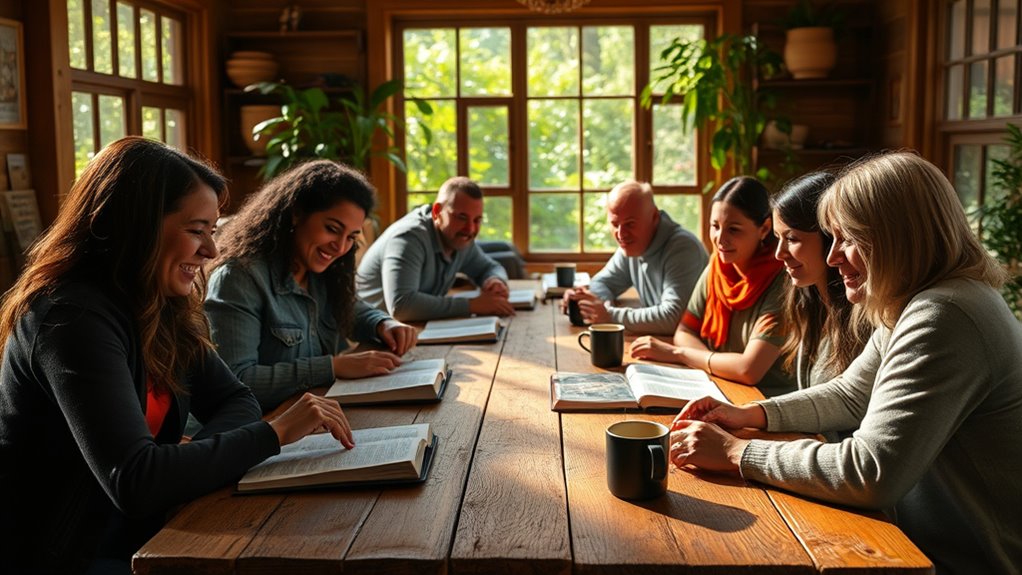You can build stronger community connections beyond Sunday by actively participating in small groups and Bible studies. Focus on creating a welcoming environment where new members feel included, and foster open dialogue to encourage personal growth. Plan engaging activities and share experiences to strengthen bonds. Address challenges with patience and honest communication. Staying consistent with schedules and shared goals helps deepen relationships and spiritual development. Keep exploring to discover more ways to nurture meaningful connections within your group.
Key Takeaways
- Foster genuine relationships through welcoming gestures, honest conversations, and shared experiences in small group settings.
- Maintain consistent schedules and open dialogue to build trust and deepen community bonds.
- Choose relevant Bible study materials and incorporate digital resources to enhance engagement and practical application.
- Promote inclusivity, cultural awareness, and confidentiality to create a safe, welcoming environment for all members.
- Organize special events, group activities, and service projects to strengthen community ties beyond weekly meetings.
The Importance of Small Group Fellowship

Small group fellowship plays a pivotal role in strengthening your faith and deepening your relationships. It provides a supportive environment where you can engage in community outreach, reaching beyond your church walls to serve others and share Christ’s love. Participating regularly helps you grow spiritually and develop leadership skills, as you take on roles within the group. These opportunities for leadership development empower you to lead discussions, organize outreach projects, and mentor new members. Small groups foster genuine connections, making your faith journey more personal and meaningful. By investing in these relationships, you build a strong foundation of trust and accountability. Additionally, small group activities can incorporate special events and themed breakfasts to foster community bonding and outreach efforts. Moreover, engaging in spiritual growth within the group can enhance your overall well-being and sense of purpose. Understanding the importance of color accuracy in visual settings can also inspire your group to create more engaging and impactful presentations or media during meetings. Incorporating gliding principles can also help members understand the importance of patience and skill development in their spiritual journey. It is also beneficial to utilize support hours effectively to ensure members receive guidance and encouragement when needed. Ultimately, small group fellowship helps you live out your faith actively, impacting both your life and the lives of those around you.
Creating a Welcoming Environment for New Members

Creating a welcoming environment for new members is essential for fostering a sense of belonging and encouraging active participation. Start with community outreach efforts, such as greeting newcomers warmly and introducing them to others. Simple welcoming gestures, like offering a friendly smile or sharing a personalized word of encouragement, go a long way in making newcomers feel comfortable. Be attentive to their questions and show genuine interest in their stories. Remember, small acts of kindness create a ripple effect that builds trust and openness. By intentionally creating an inviting atmosphere, you help new members feel valued and connected, encouraging them to deepen their involvement. Incorporating emotional intelligence into your interactions can further enhance the sense of community and understanding among members. Recognizing personal boundaries and respecting individual comfort levels can also foster a safe and supportive environment. Being aware of privacy policies and maintaining confidentiality when appropriate can strengthen trust within the group. Paying attention to the diverse backgrounds of members can also promote inclusivity and reinforce a welcoming environment. Developing cultural awareness can further strengthen your group’s community and set the foundation for meaningful relationships to grow.
Strategies for Effective Bible Study Sessions

To run effective Bible study sessions, you need to choose materials that resonate with your group’s interests and spiritual growth. Encouraging open dialogue helps everyone share insights and ask questions freely. Additionally, being aware of local store hours can help you plan logistics for your meetings, such as securing space or coordinating transportation. Planning ahead for meeting logistics ensures smoother sessions and better attendance. Establishing clear testing methodologies can help ensure that the material is effective and meets the spiritual needs of your group. Incorporating best practices for small groups can further enhance the overall experience and foster deeper connections among members. Understanding the importance of security measures in protecting your group’s privacy can also contribute to a safe and trusting environment.
Choosing Relevant Materials
How do you guarantee your Bible study sessions stay meaningful and engaging? Start by choosing relevant materials that resonate with your group’s needs. Incorporate digital outreach to find resources, articles, or videos that connect scripture to real-life challenges. When selecting a venue, consider a comfortable, distraction-free space that encourages open discussion. Tailor your content to address current issues your members face, ensuring topics are relatable and thought-provoking. Use a mix of biblical passages, contemporary perspectives, and practical applications to keep sessions lively. Remember, relevant materials foster deeper understanding and active participation. Additionally, exploring engaging decor ideas can inspire creative ways to decorate your meeting space, making it more inviting. Utilizing predictive analytics can help identify which topics most resonate with your group, creating a more personalized experience. Incorporating interactive discussion methods can further enhance engagement and understanding during sessions. By thoughtfully choosing content and a welcoming environment, you create a space where members feel inspired and connected beyond just Sunday service. For sustained growth, regularly updating your materials based on feedback and analytics ensures your sessions remain impactful and tailored to your group’s evolving needs.
Fostering Open Dialogue
Once you’ve selected relevant materials that resonate with your group, the next step is fostering open dialogue. To do this effectively, focus on trust building by creating a safe space where everyone feels comfortable sharing. Encourage active listening by giving your full attention, nodding, and asking clarifying questions. When participants feel heard and respected, they’re more likely to open up and engage meaningfully. Set ground rules that promote honesty and confidentiality, reinforcing that all perspectives are valuable. Remember, your role is to facilitate rather than dominate the conversation. By nurturing trust and practicing active listening, you create an environment where honest, respectful dialogue flourishes, deepening understanding and strengthening community bonds during your Bible study sessions. Incorporating trust-building strategies can significantly enhance the effectiveness of your sessions. Additionally, understanding the power of instant torque and how electric bikes operate can serve as a metaphor for the importance of quick, honest communication within your group.
Establishing Consistent Schedules
Establishing a consistent schedule is essential for maintaining engagement and ensuring everyone can participate regularly. When you set a regular time, it becomes easier to foster consistent attendance and strengthen your group’s bond. Use timely communication to remind members of upcoming meetings and confirm availability. Consistency helps members plan ahead, reducing last-minute conflicts. To evoke emotion and commitment, consider these factors:
| Commitment & Connection | Flexibility & Understanding |
|---|---|
| Builds trust and routine | Shows care for members’ needs |
| Encourages accountability | Promotes grace in scheduling |
Implementing reliable scheduling tools can further streamline the process and help keep everyone on the same page. A steady schedule cultivates a sense of community, making Bible study sessions more meaningful and impactful. When everyone knows what to expect, your group grows closer, and spiritual growth flourishes. Regularly reviewing group schedules can also help identify the best times for all members to participate and adapt as needed. Additionally, understanding family dynamics can help tailor meeting times to accommodate members’ personal commitments and responsibilities. Incorporating sound practices from effective scheduling strategies ensures your group remains engaged and motivated over time.
Encouraging Personal Growth and Spiritual Development

To foster personal growth, focus on strengthening your faith connections through honest conversations and shared experiences. Encourage reflection by asking meaningful questions that help members evaluate their spiritual journey. By doing so, you’ll create an environment where everyone feels motivated to grow closer to God and understand their purpose more deeply.
Deepening Faith Connections
How can small groups and Bible studies foster deeper faith connections? By creating intentional spaces for open dialogue and shared experiences, you can support each other’s faith journey. Regular discussions help uncover personal insights, challenge doubts, and celebrate spiritual milestones. As you grow together, you’ll find opportunities to deepen your understanding of Scripture and apply it to daily life, fostering spiritual maturity. These connections encourage accountability and prayer support, strengthening trust and vulnerability within the group. When everyone commits to exploring faith authentically, your bonds become more meaningful, fueling personal growth. Ultimately, small groups become a essential environment where faith is nurtured, questions are welcomed, and spiritual development flourishes beyond Sunday services.
Nurturing Personal Reflection
Personal reflection plays a vital role in fostering spiritual growth because it encourages you to examine your beliefs, experiences, and motivations intentionally. One effective way to nurture this is through daily journaling, which helps you process insights and track your spiritual journey. Prayerful reflection allows you to connect deeply with God, seeking guidance and understanding in quiet moments. By setting aside time each day for these practices, you create space for personal growth and self-awareness. Small groups can support this process by sharing reflections and encouraging accountability. Ultimately, consistent engagement in daily journaling and prayerful reflection helps you develop a more authentic faith, deepen your relationship with God, and grow in your spiritual maturity.
Building Lasting Friendships Through Shared Experiences

Ever wonder why some friendships last a lifetime while others fade quickly? Building lasting friendships often comes down to shared experiences. Here are three ways you can deepen those bonds:
- Join a book club together to discuss faith and life, creating meaningful conversations.
- Participate in a service project, working side by side to make a difference.
- Plan regular group outings or retreats that foster fun and connection beyond weekly meetings.
Shared experiences like these help you build trust, understanding, and genuine care. They turn acquaintances into friends who support each other through life’s ups and downs. When you engage in meaningful activities with your small group, you create memories that strengthen your community and keep your friendships thriving over time.
Overcoming Challenges in Small Group Dynamics

While shared experiences can strengthen friendships, small groups often face challenges that threaten their unity. Conflict resolution becomes essential in these moments, helping members address issues openly and respectfully. By fostering honest communication, you create a safe space where differences can be navigated without division. Additionally, overcoming challenges offers opportunities for leadership development within your group. When members step into roles of guidance or support, they grow more confident and engaged. As you work through disagreements and setbacks, remember that resilience builds stronger connections. Embracing these challenges with patience and intentionality allows your group to thrive, deepening bonds and reinforcing shared purpose. Ultimately, effective conflict resolution and leadership development are key to sustaining a healthy, dynamic small group community.
Frequently Asked Questions
How Can I Start a Small Group if I Feel Shy?
If you feel shy about starting a small group, remember you don’t need to be perfect. Begin with simple steps like inviting a few friends or acquaintances. Use icebreaker games to ease tension, and consider prayer partnerships to build trust. Focus on creating a welcoming environment, and don’t pressure yourself. As you grow more comfortable, you’ll find leading the group becomes more natural, helping everyone deepen their faith together.
What Are Some Ways to Include Introverted Members?
Imagine quiet lakes reflecting the sky—your introverted members need space to shine. To include them, offer personalized invitations that make them feel valued without pressure. Encourage silent participation, allowing them to engage in ways comfortable for them. Create a welcoming environment where they can slowly open up, much like gentle ripples spreading outward. By respecting their pace, you help them feel seen and appreciated, strengthening your community’s bonds.
How Do We Handle Disagreements During Bible Studies?
When disagreements arise during Bible studies, you should prioritize conflict resolution through respectful dialogue. Encourage everyone to listen actively, acknowledge differing perspectives, and stay calm. Remind your group to focus on understanding rather than winning arguments. If tensions escalate, take a break or revisit the discussion later. By fostering an environment of respect and open communication, you help maintain a healthy, trusting community that grows stronger through honest, compassionate conversations.
What Activities Foster Deeper Connections Beyond Bible Discussions?
Did you know that participating in activities like cooking nights or service projects increases community bonds by 60%? You can foster deeper connections beyond Bible discussions by organizing cooking nights where members share meals and stories. Service projects also encourage teamwork and purpose, strengthening relationships. These activities create shared experiences, making your community more vibrant and supportive, ultimately helping members grow closer and more engaged beyond just Sunday services.
How Can Small Groups Serve Community Outreach Effectively?
You can serve community outreach effectively by organizing faith-based service projects that involve your small group. Focus on outreach collaboration with local organizations to meet community needs. By actively participating in events like food drives, volunteer efforts, or neighborhood cleanups, you demonstrate faith in action. This not only deepens your group’s impact but also strengthens bonds among members and builds meaningful relationships within your community.
Conclusion
By diving into small groups and Bible studies, you’re not just building community—you’re creating a bond so strong it could move mountains! These connections become your spiritual lifeline, transforming your faith journey into an adventure of epic proportions. Don’t underestimate the power of these tiny gatherings; they’re the secret weapon that can turn ordinary Sundays into extraordinary, life-changing experiences. Get involved, and watch your faith and friendships grow beyond what you ever imagined possible!










